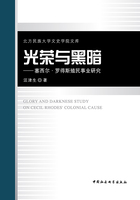
第2章 摘要
塞西尔·罗得斯是19世纪中后期英国在南部非洲进行殖民扩张的主要策划者和行动者之一,他狂热坚持由开普向北方扩张的北向战略。罗得斯在19世纪末英国攫取贝专纳兰、打通大北通路和获得英政府委任状,组建英国南非公司并最终占领马绍纳兰、马塔贝莱兰建立罗得西亚殖民地,以及阴谋推翻克鲁格统治的“詹姆逊袭击”等一系列重大地区事件中都发挥了举足轻重的作用。无论在南部非洲近现代历史上,还是在非洲殖民主义史上,罗得斯都是具有重要影响的历史人物之一。因此,对他的殖民事业和殖民思想进行研究应该是具有重要意义的。本书立足演讲稿、书信、档案、传记等原始资料,以其他学者的研究成果为基础,悉心解读相关材料,对罗得斯的殖民历程、殖民思想和对南部非洲的影响、作用等问题进行了细致的梳理和研究。
全书的主体内容共分为五章。
第一章论述了罗得斯的家庭背景、童年和少年时期在英国的生活状况以及后来因病去南非疗养、早年发展后又辗转回国进入牛津大学深造的曲折过程,对其青年时代思想脉络的发展、变化和殖民主义思想的初步形成进行了探讨。
第二章论述了青年罗得斯在非洲早期的经济投机行为,对1877年后罗得斯的主要经济活动做了研究和梳理。主要结论:罗得斯所进行的这些经济活动是其在非洲殖民事业的重要组成部分,是为实现其政治抱负而奠定的经济基础,对其后来政治活动的开展具有很大的推动与帮助作用。
第三章论述了19世纪中后期罗得斯与英国在南部非洲的殖民扩张历程,对于罗得斯参与的一系列影响南部非洲政治格局的重大事件进行了详细分析。从中可见罗得斯在英国19世纪中后期的南部非洲殖民进程中发挥了相当大的主导作用。
第四章主要以罗得斯的演讲稿、遗嘱等原始材料为依据,结合其政治实践,讨论剖析了罗得斯的殖民主义思想。罗得斯的殖民主义思想的主要特点是带有浓厚的种族主义特征,具体可以分为两个层次,即强调白人优越的狂热的种族论思想和歧视非洲原住民的种族隔离思想。本书指出坚定的殖民思想是罗得斯在非洲毕生从事殖民活动的精神原动力。
第五章在上述几章基础上,以马克思的“双重使命”论为分析工具从建设性和破坏性两个方面探讨了罗得斯在19世纪中后期南部非洲殖民进程中的作用、地位及深远的历史影响。
Abstract
Cecil Rhodes was one of the main planners and actors who carried out colonial expansion in Southern Africa for the interests of England in late 19th century.He persisted in keeping open a road to the north from the Cape and building a railway from the Cape to Cairo.Rhodes played a pivatal role in a series of important events of region,such as occupying Bechuanaland,opening up access to north,obtaining the Charter,establishing British South Africa Company,forming Rhodesia by invading Mashonaland and Matabeleland and taking part in "Jameson Raid" against Kruger.No matter in modern history of Southern Africa or in African colonial history did Rhodes be an important influential figure.Therefore,it remains a meaningful matter to research on his colonial enterprise and thinking.Based on the principle that all the materials,such as speeches,letters,archival documents,biographies and all kinds of books and articles would be judged and used,this book examines many topics.For example,Rhodes' colonial history,Rhodes' colonial ideology and his influence on Southern Africa.
Besides the preface and the epilogue,there are five chapters in this book.
Chapter One plays a role in the background.The chapter,including two parts,elaborates several topics as followed:Rhodes' family circumstances,his childhood and adolescence in England,the reason why he went to South Africa,and late access to Oxford University.In addition,the chapter investigates the development of the train of Rhodes' thoughts and the initial formation of his colonial thinking.
Chapter Two mainly discusses Rhodes' economic colonization behaviors after 1877 and details important accounts of his founding de Beers Mining Company,amalgamating all the diamond mines of Kimberley to found the de Beers Consolidated Mines Company and establish Goldfields Company.The conclusion is that these economic activities are an important component of Rhodes' African colonial enterprise,which lay the economic foundation to achieve his political aspirations and promote his future political activities.
Chapter Three mainly elaborates the history of colonial expansion of Rhodes and England in Southern Africa in late 19th century goes into details a series of events which influence the political situation in Southern Africa.It analyses Rhodes' instigation of the British Government strongly to win Bechuanaland and open up the Great Northern Road.It also probes into the capture of a broad river district and the formation of Rhodesia after Rhodes.It looks into the "Jameson Raid" which seriously intensified the contradiction between the British and Boer and foreshadowed the outbreak of Anglo-Boer War when Rhodes' political ideal of establishing the Union of South Union encounter with Kruger.It can be seen that Rhodes exerted a considerable dominant in colonization process in Southern Africa in late 19th century.
Chapter Four discusses the colonial ideology of Rhodes,based mainly on his speeches and other raw materials that combined with his political practice.The characteristic of strong racism is the main feature of Rhodes' colonial ideology,which can be divided into two parts.One is emphasis on the thinking of white racial superiority,the other is the idea of discrimination against African natives.The first part underwent a process of development and change.There are three different components in it,including supremacy of Anglo-Saxon nation,union of Anglo-Boer and the union of the English-speaking peoples throughout the world,which is to win over the United States.The second part can be subdivided into two levels,such as the thought of discrimination against blacks and apartheid.Overall,the two parts of Rhodes' colonial ideology are complementary.The author emphasized that the colonial ideology is a deep thrust for colonization.
On the basis of above four chapters,chapter Five holds the dual mission of Marxist theory as the theoretical tools and discusses the role of Rhodes in colonization process in Southern Africa in late 19th century.Adhere to evidence-based analysis of specific issues and attitudes,this chapter makes an objective assessment on Rhodes.There are three topics as followed:(1)the relationship between Rhodes and the formation of the new political situation in Southern Africa,(2)the relationship between Rhodes and the modern development in the region,(3)exploitation and plunder on natives in Southern Africa.
Through out research and analysis of Rhodes,the epilogue emphasizes and points out that the intention of the book is to clerify and resolve three problems,such as the relationship between the individual and the timesand the social forms,the relationship between economic colonial problems and political colonial problem and the understanding of the dual mission.Through the above efforts,the book would make a contribution to the history of colonialism in our country.
Key words:Cecil Rhodes;Colonialism;Southern Africa;Influence;Role